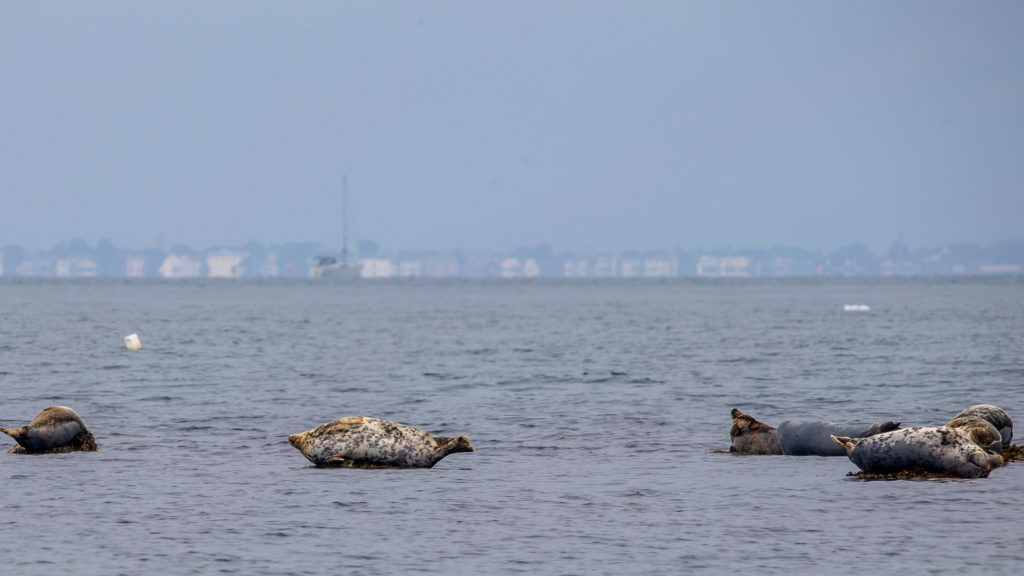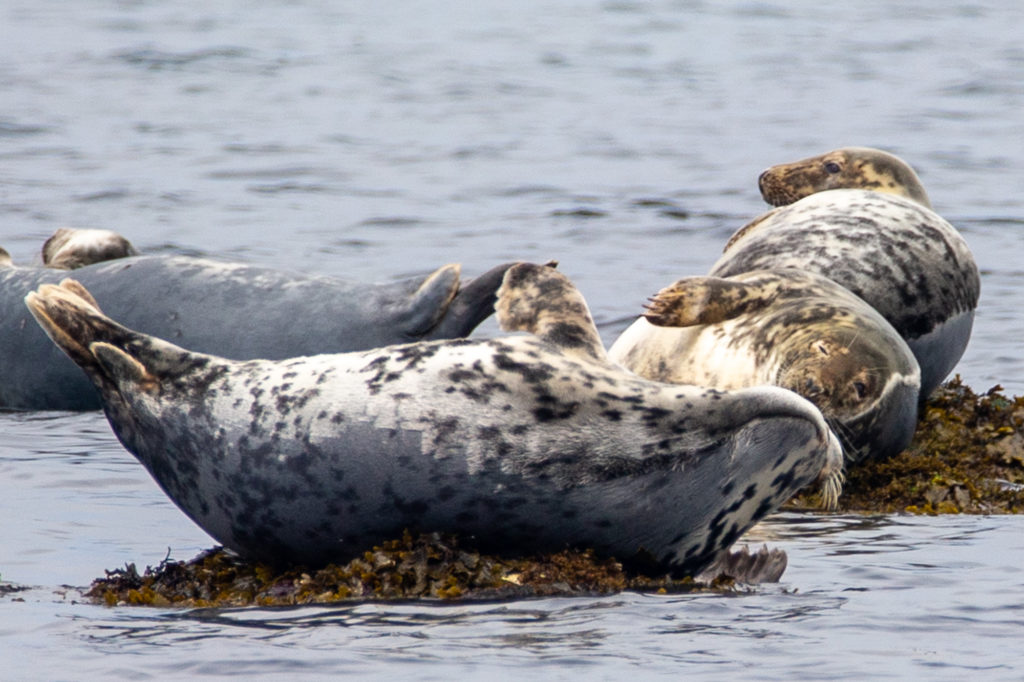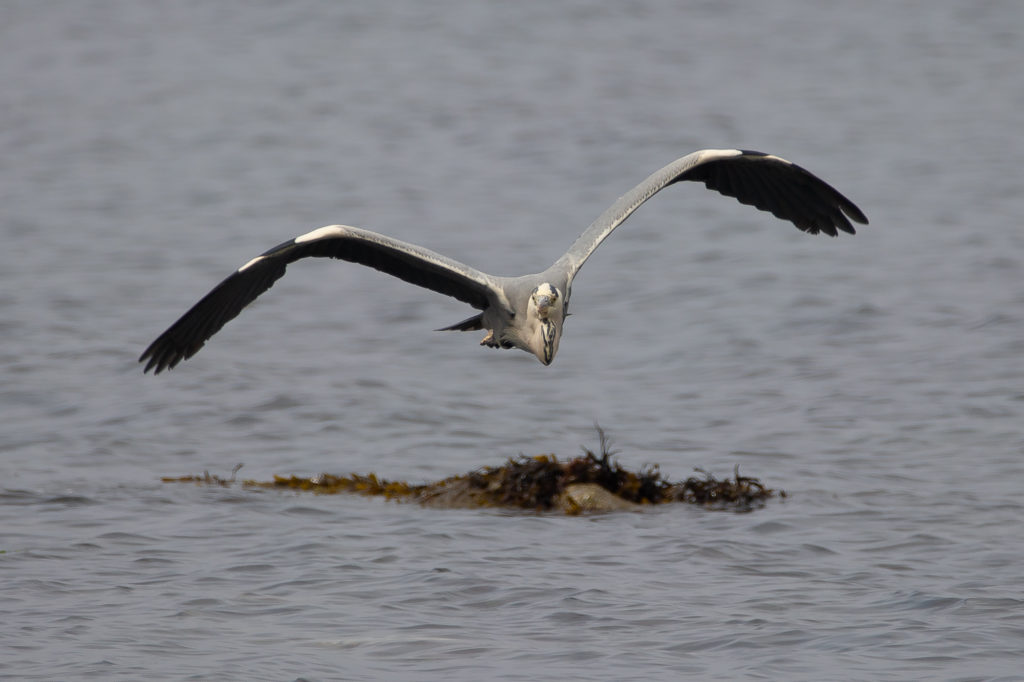We heard the siren call of the seals this afternoon. Pod, rookery or harem, there were upwards of a dozen of the pinnipeds basking in the diffuse light on rocks exposed by a very low tide.
It was befitting of Bloom’s Day to see the seals in Sandycove where James Joyce spent six nights in 1904. ‘A sleek brown head, a seal’s, far out on the water, round’ was his description of Buck Mulligan in Ulysses. Could this have been inspired by the Sandycove ancestors of these seals?

These are creatures adapted in the most incredible ways to thrive in their chosen niche. Streamlined creatures with exquisite hearing and a neck with awesome flexibility, they are finely honed predators. It was the first time I’d seen them like this, partially because the harbour seal population has taken almost 50 years to recover from the persecutions by local commercial fishing interests. And there they were, barking out their eerie siren calls in the middle of the afternoon 50 metres from a busy road and 250 m from Joyce’s Tower.

Harbour Seals 
Grey Heron
Growing up in one world and moving to another provides perspective. I grew up in a bubble within a third world bubble and have since spent most of my life in various kinds of bubbles within a first world bubble of some 20% of the global population.
Make no mistake, the Republic of Ireland was still in the third world in the 1970s. I believe that Irish society benefitted from joining Europe in 1973. An exchange was made in evolving from being an abused colony to wayward independent republic to membership of a union of nations. Ireland came to accept a fair degree of homogenisation and critically, adapted to and even adopted the values of the European community. If not for the pandemic or Brexit, I would have said that the post-crash economic growth and a young, educated population positioned Ireland well for the future. Despite some of the issues with homogenisation and governance, Ireland is still doing well within Europe.
My growth bubble included living in a house my parents owned and a private education that culminated with a stint in university. I was among the first in my extended family to graduate from third level education.
The third world bubble that confined us included The Troubles and car bombs, rolling utility strikes over the usurious working conditions among those few who had the rare jobs, useless partisan political leadership, a retrograde religious influence and destructive fiscal and social policies.
In a career of more than four decades, I worked but one year in Ireland. Emigration was to be an interim solution and we spent a decade in unstable employment bubbles in the first world bubble that is the USA. Just two of the nine in my college year remained in Ireland. My wife and I left, driven by desperation, fearlessness, self-confidence and recklessness as much as anything else.
We do what we must to fulfil the clichéd expectation of perpetual progress, hoping to leave the next generation in a better state than the last. We tried to make this happen though it was a long term aspiration and there were many privations along the way.
Then ignobility seemed to return to countries we had come to see as nobler than most.
‘As you are now so once were we’
The ignobility of low character, of base instinct and other dishonourable traits are increasingly appealing to societies around the world. We were troubled by it longtime in Ireland. It’s time we called out the currently fashionable ignobilities of intolerance, mendacity, corruption, unaccountability, short-termism and extreme self-interest before it’s too late for this generation and the many more to come.
American philosopher and gender theorist Judith Butler introduced the concept of grievability. She asks ‘whose lives are considered valuable, whose lives are mourned, and whose lives are considered ungrievable.’ It seems to me that a fair summary of her proposition is that if you can’t be mourned perhaps you never mattered. A barrel bomb can test for that. I was ‘research’ reading online recently and came across a Guardian article from 2017 by Butler and Başak Ertür. There’s a chilling line where they opine of Turkey that the ‘word “peace” becomes code for “terrorism”‘.
Some might say that Turkey’s leadership today is ignoble in conflating peace and terrorism.
‘I resent violence or intolerance in any shape or form. It never reaches anything or stops anything. A revolution must come on the due installments plans. It’s a patent absurdity on the face of it to hate people because they live round the corner and speak a different vernacular, so to speak.’
In China, analytics is being used to jail Xinjiang Uyghur for pre-crimes. The government is taking preventive measures in advance of crimes. They are not alone. Some would argue that crime prevention and crime prediction are entirely different dragons.
There may be some that consider this a sign of increasingly ignoble behaviour by an authoritarian Chinese leadership.
‘What’s yours is mine and what’s mine is my own.’
Here’s an interesting article by George Monbiot also in the Guardian newspaper. It suggests that recent public healthcare catastrophes were avoidable.
‘Be just before you are generous.’
Brazil’s death toll from Covid-19 has relegated the UK to 3rd place on the table of pandemic deaths (Johns Hopkins). The US continues to lead these three of the newly ignoble governments.
I could go on. Perhaps the easiest thing to do is to call for an ignobility perception index by which to rank the performance of the governments of the world. The perception of grievability could be a very useful metric.
Don’t get me wrong. I think that Hans Rosling (Gapminder) was correct when he pointed out that things are improving. Factfulness is a an excellent read. I also agree that things could be better still, far better. And I believe we should continue his efforts to redirect our energies into constructive activities.
There are already many indices to rate performances. Among them:
– The Global climate change performance index
– The Corruption Perception Index from Transparency International.
The seals have returned to Dublin Bay because the rogue fishermen were convinced to cease and desist their slaughter. The countries we emigrated to were welcoming havens and we remain grateful for the opportunities they provided.
My perception is that ignobility is on the rise faster than it was in the 1930s. My belief is that it’s worth monitoring ignobility before we no longer have the rights to monitor it. This is all part of adapting to a world whose population has almost doubled since I first left the third world I was born into.
The quotations in blue are from Ulysses by James Joyce.
All of the photographs were taken today. © Simon Robinson 2020

Leave a Reply